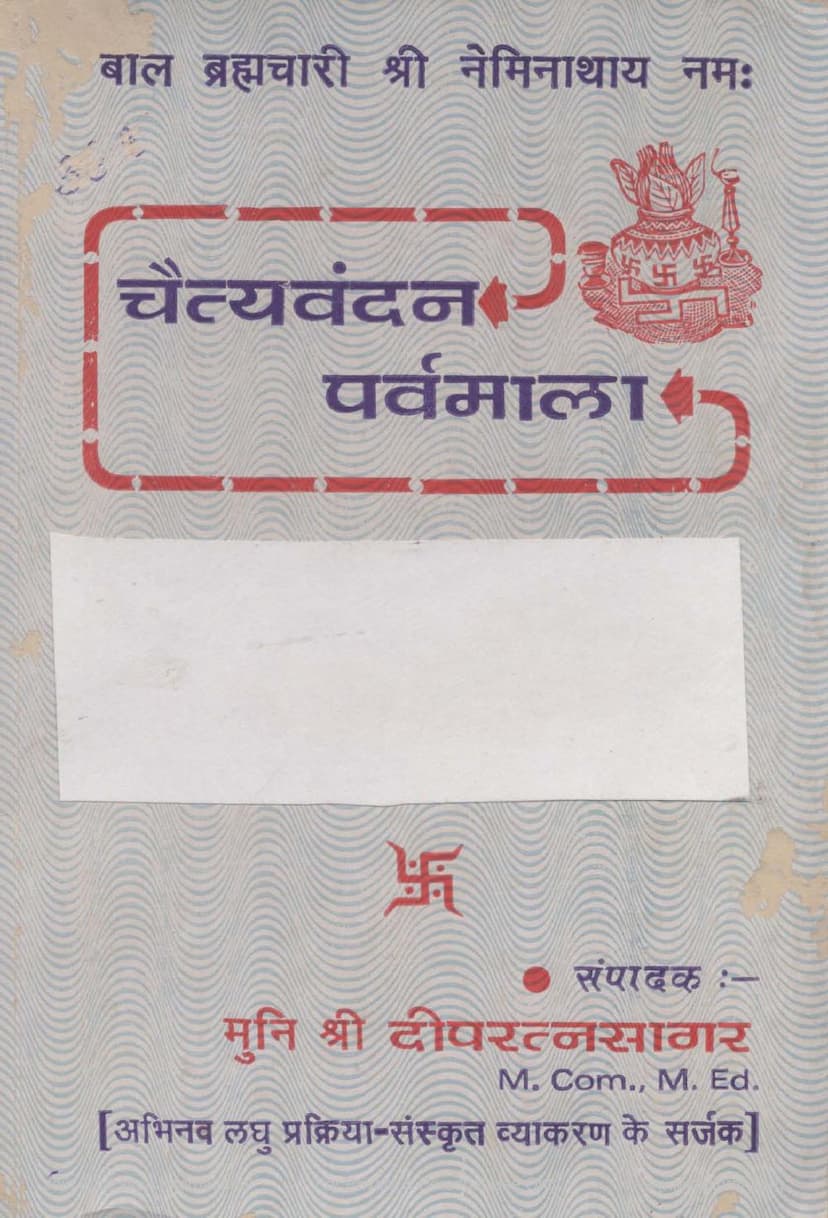Chaityavandan Parvamala
Added to library: September 1, 2025

Summary
This is a comprehensive summary of the Jain text "Chaityavandan Parvamala" by Muni Shri Deepratnasagar, published by Abhinav Shrut Prakashan, based on the provided pages.
Book Title: Chaityavandan Parvamala (A Garland of Chaityavandanas for Festivals and Observances) Author/Editor: Muni Shri Deepratnasagar (M.Com., M.Ed., Creator of "Abhinav Laghu Prakriya - Sanskrit Grammar") Publisher: Abhinav Shrut Prakashan Subject: Jain Rituals and Devotion, specifically focusing on "Chaityavandan" (veneration of Jain temples and deities).
Overview:
The "Chaityavandan Parvamala" is a collection of devotional verses and hymns (Chaityavandanas) intended to be recited during various Jain festivals, auspicious days, and specific observances. The book aims to provide a structured and comprehensive resource for devotees to engage in ritualistic worship and spiritual reflection throughout the year. It is presented as a devotional offering, encouraging the flow of devotion from the heart.
Key Content and Structure:
The book is meticulously organized, with an extensive index (Anukramanika) detailing various Chaityavandanas dedicated to specific dates, occasions, or themes. The index provides the serial number, the name of the Chaityavandana, and the page number for easy navigation.
The text covers a wide range of Jain observances, including:
-
Specific Dates/Tithis:
- Bij (Second day of the lunar fortnight) - Dedicating verses to the tithi and highlighting the Kalyanaks (auspicious events in the lives of Tirthankaras) that occurred on this day.
- Pachmi (Fifth day of the lunar fortnight) - Including specific Chaityavandanas for "Gyan Panchmi" (Knowledge Fifth) and "Samanya Panchmi" (General Fifth), emphasizing the importance of knowledge and auspicious events on these days.
- Ashtami (Eighth day of the lunar fortnight) - With multiple Chaityavandanas, detailing the significant events and virtues associated with this day.
- Ekadashi (Eleventh day of the lunar fortnight) - Differentiating between "Maun Ekadashi" (Silent Eleventh) and "Samanya Ekadashi" (General Eleventh).
- Chaturdashi (Fourteenth day of the lunar fortnight) - Including "Choumasa Chaturdash" and "Samanya Chaturdash."
- Purnima (Full Moon) and Amavasya (New Moon) - Dedicated Chaityavandanas for these days.
-
Major Jain Festivals:
- Paryushan Parva - A significant portion of the book is dedicated to the hymns for this most important Jain festival, covering various aspects like worship, fasting, and devotional practices. It includes mentions of the Kalpa Sutra and the birth of Lord Mahavir.
- Diwali - Hymns related to the observance of Diwali, often linked to Lord Mahavir's Nirvana and the enlightenment of Gautam Swami.
- Siddhachakra and Navpad - Chaityavandanas for venerating the Siddhachakra, a sacred diagram, and the Navapada (nine supreme beings).
-
Tirthankaras and Key Figures:
- Specific Chaityavandanas are presented for various Tirthankaras, often referencing their birth, दीक्षा (initiation), केवलज्ञान (omniscience), and निर्वाण (liberation) dates and associated events.
- Chaityavandanas for Gautam Swami and other Ganadharas (chief disciples of Tirthankaras).
-
Tapas (Austerities):
- The book includes Chaityavandanas related to specific fasts and austerities like "Rohini Tap," "Vardhaman Tap," "Vees Sthanak Tap," "Akshay Nidhi," and "Upadhan Tap," highlighting their significance and devotional aspects.
-
The Five Jnan (Types of Knowledge):
- The book dedicates sections to Chaityavandanas for each of the five types of Jain knowledge: Mati (Sense Knowledge), Shrut (Scriptural Knowledge), Avadhi (Intuitive Knowledge), Manahparyav (Mind-Reading Knowledge), and Keval (Absolute Knowledge).
-
General Devotional Themes:
- Emphasis on the importance of devotion, knowledge, karma, detachment (virati), and the path to liberation.
- Encouragement to perform rituals with pure intentions and to seek spiritual upliftment.
Editorial Approach and Purpose:
Muni Shri Deepratnasagar, as the editor, highlights in the Prastavana (Preface) that while collections of stanzas (stavan-sajh-thoyana) exist, a comprehensive collection of Chaityavandanas was lacking. He conceived this work to provide a structured resource that aligns with the context and covers diverse topics. Having already authored significant grammatical works, he wished to contribute to the realm of devotional practice.
The book is presented as a sincere effort to offer a valuable resource to the Jain community. It is inspired by the intention to aid those who perform Trikal Devavandan (worship three times a day) and to support those who observe fasts and rituals during special days. The editor expresses a desire for the collection to foster the flow of devotion and help devotees achieve Kshayi Samyag Darshan (lasting right faith).
Key Takeaways:
- Comprehensive Resource: This book is a highly organized and extensive compilation of Jain devotional songs for various occasions.
- Devotional Focus: The primary purpose is to facilitate and deepen the devotional practice of Jain followers.
- Educational and Ritualistic: It serves as both a guide for performing rituals and a source of spiritual inspiration, linking specific dates and festivals with their religious significance and associated Tirthankara events.
- Promotes Knowledge and Austerity: The inclusion of Chaityavandanas for the five types of knowledge and various austerities emphasizes their importance in the Jain path.
- Aimed at All Sections of the Sangha: The collection is intended for the entire Jain community (Shraman Bhagwantos, Shravak, Shravika) to support their spiritual journey.
In essence, "Chaityavandan Parvamala" is a vital compilation for any Jain seeking to deepen their understanding and practice of devotional rituals throughout the year.